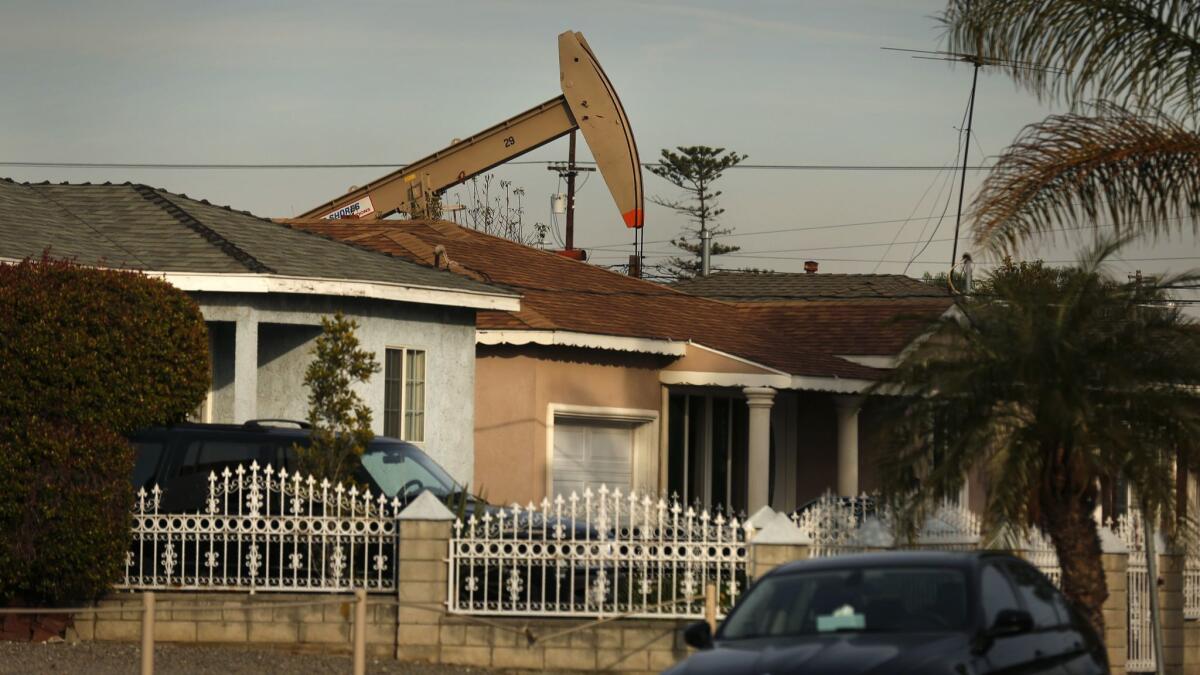L.A. needs to be more proactive on checking oil sites, city controller says

- Share via
Los Angeles has had a “lax and reactive” approach to checking to see if oil and gas drilling sites are operating in line with city conditions, City Controller Ron Galperin said in a new report Wednesday that calls on the city to step up its oversight.
Those concerns echo a Times report that found the city had no systematic way to make sure that the rules crafted for each petroleum site were being followed.
Nearly four years ago, planning officials acknowledged the need for a new system to monitor and enforce those site-by-site conditions, which are meant to address noise, smells and other nuisances.
But no such program has been created. Rules for drilling sites that were approved decades ago are tucked into city archives, not in any electronic database that can be easily accessed.
Galperin urged the city to regularly review whether oil and gas sites are adhering to city conditions governing how they can operate — an idea that is now being vetted at City Hall. Petroleum Administrator Uduak-Joe Ntuk recently told lawmakers in a report that there is “no centralized system” for sharing information from inspections done by different departments.
Galperin and his staff found that generally, “the city did not effectively exercise local control over oil and gas drilling sites due to the historical nature of drilling activity combined with a fragmented approach to oversight.”
Hiring Ntuk to oversee oil and gas operations across the city — a job that had not been filled consistently for decades — was a good step toward fixing that, the controller said.
But “the office has been around for less than two years. It’s quite understaffed ... and it’s trying to clean up 30-plus years of inattention,” Galperin said.
The city also needs to make sure Ntuk can get reliable, timely information, the report said.
For instance, well operators or other regulatory agencies do not have to let the petroleum administrator know about complaints. Ntuk said that in one recent case, he found out about a violation from another agency only months later, after turning in a public records request.
“I do get information from regulatory agencies, but I know I don’t have a comprehensive catchall of everything,” Ntuk said.
L.A. has faced mounting calls from environmental activists and neighborhood groups to scrutinize oil and gas drilling more closely, with some pushing to halt oil operations near homes and schools entirely.
More than 700 wells are active across the city — some of them located close to homes or schools — and thousands more are plugged or buried.
“For many years, the city was just not minding the store,” said Martha Dina Arguello, executive director of Physicians for Social Responsibility Los Angeles.
Last year, the city imposed stiff new rules on an oil production site on Jefferson Boulevard in South L.A., requiring new measures including a 45-foot-tall enclosure to muffle noise and reduce odors. The company that now owns the site, Sentinel Peak Resources, has since sued the city over the decision, calling the requirements “unduly oppressive.”
The report said that process, which was spurred by complaints from neighbors, “may serve as a model for future oversight activities,” but that the city needed to regularly and proactively check on all drilling sites. It urged the city to create a comprehensive monitoring and inspection program for oil and gas sites that crosses city departments.
“This is, on the whole, an excellent and wise report that recommends critical reforms that will make a big difference,” said Michael Salman, a West Adams resident and UCLA associate professor who has raised concerns about oil oversight.
He urged the city to also press for 24-7 emissions monitoring at all sites and to make sure the planning department plays its role.
Galperin also recommended that the city require well operators to keep up insurance and adequate bond coverage, create a website where people could look up information and submit complaints, and look into a new tax on oil extraction to fund oversight.
California Independent Petroleum Assn. Chief Executive Rock Zierman said in a written statement that while the industry group supported many of the recommendations, “the report fails to acknowledge the significant changes enacted at the state level that have increased neighborhood air quality monitoring as well as the testing, monitoring, and surety bonds required for idle wells.”
“Raising taxes on oil in the city of Los Angeles will not improve well safety,” Zierman added, pointing out that L.A. voters had rejected such a tax in the past.
The report suggested that growing awareness of the effects of urban oil and gas extraction, along with the massive gas leak in Aliso Canyon a few years ago, may have shifted voter attitudes since the last tax was rejected.
Arguello said she didn’t think the report went far enough, arguing that the city should phase out oil drilling within 2,500 feet of homes and schools.
Twitter: @AlpertReyes
More to Read
Sign up for Essential California
The most important California stories and recommendations in your inbox every morning.
You may occasionally receive promotional content from the Los Angeles Times.














